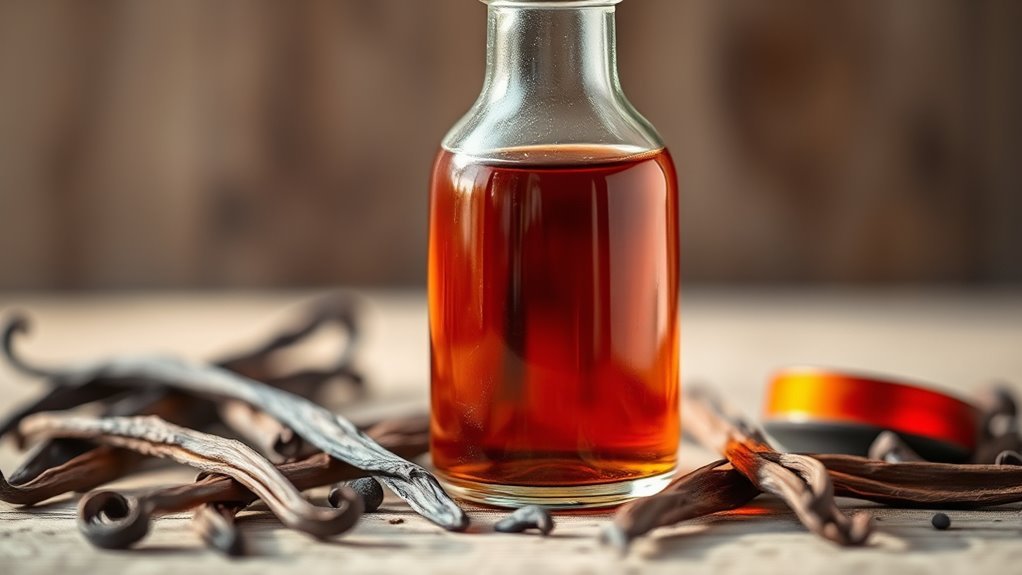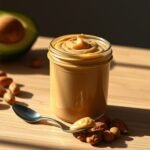Yes, vanilla extract can be keto-friendly when used in moderation. It typically contains around 0.5 grams of carbs per teaspoon, which is minimal for low-carb diets. You should opt for pure varieties without added sugars, as hidden sugars can spike insulin and disrupt ketosis. Use it sparingly to enhance flavors in your recipes. Exploring certain alternatives can also add variety to your meals. Discovering more about these options can help you maintain your keto lifestyle effectively.
Understanding Vanilla Extract’s Nutritional Profile

When you’re exploring whether vanilla extract fits into a keto diet, it’s essential to first understand its nutritional profile. Vanilla’s origins trace back to Mexico, where the vanilla orchid thrives. This beloved flavoring boasts a complex flavor profile, characterized by sweet, floral notes that can elevate your dishes. While pure vanilla extract primarily consists of water and alcohol, its main flavor compounds are vanillin and other aromatic compounds. These compounds not only enhance taste but also offer potential antioxidant benefits. Importantly, when using vanilla extract in moderation, it can complement your keto-friendly recipes without greatly impacting your overall nutritional intake. Understanding this balance allows you to enjoy the rich essence of vanilla while adhering to your dietary preferences.
Carbohydrate Content in Vanilla Extract

When considering vanilla extract for a keto diet, it’s important to look at its carbohydrate content. A typical serving contains minimal carbs, but sugar-free options can further reduce this amount. Keep in mind that serving sizes can vary, so checking the nutritional facts is essential to stay within your carb limits.
Vanilla Extract Nutritional Facts
Vanilla extract, a popular flavoring agent, has garnered attention for its potential role in keto diets. With minimal carbohydrate content—typically around 0.5 grams per teaspoon—it’s a viable option for those seeking to enjoy its rich flavor without derailing their dietary goals. The vanilla extract benefits extend beyond taste, as it’s also known for its antioxidant properties, which may support overall health. When considering vanilla extract uses, it can enhance desserts, beverages, and even savory dishes, making it a versatile ingredient in your keto cooking arsenal. Incorporating vanilla extract into your meals can elevate flavors while keeping your carb intake in check, allowing you to savor the freedom of delicious, guilt-free treats.
Sugar-Free Options Available
For those on a keto diet, finding sugar-free options can be a game-changer, and vanilla extract is no exception. Many brands offer pure vanilla extract with no added sugars, making it a fantastic choice for flavor enhancements in your recipes. When you’re looking for sugar substitutes, consider options like stevia, erythritol, or monk fruit, which can complement vanilla’s rich flavor without adding carbs. Always check the labels, as some extracts may contain hidden sugars. By choosing sugar-free vanilla extract, you can enjoy the delightful taste while staying within your carb limits. This way, you can create delicious keto-friendly dishes without sacrificing flavor or your dietary goals. Embrace these options for a satisfying and guilt-free culinary experience!
Serving Size Considerations
Choosing sugar-free vanilla extract is a smart step, but understanding serving sizes is equally important for maintaining a keto-friendly diet. Even though vanilla extract is low in carbs, consuming it in excess can lead to unwanted carbohydrate intake. Moderation is key, so let’s break it down:
| Serving Size | Carbohydrates (g) | Notes |
|---|---|---|
| 1 tsp | 0.5 | Common usage |
| 2 tsp | 1.0 | Slightly more |
| 1 tbsp | 2.0 | Use sparingly |
| 2 tbsp | 4.0 | Limit to recipes |
| 1 oz | 6.0 | High in carbs |
Effects of Sugar on Ketosis

When you’re following a keto diet, understanding sugar’s role in metabolism is essential. Consuming sugar can spike your blood sugar levels, which may hinder your body’s ability to maintain ketosis. This makes it important to monitor your sugar intake to stay in fat-burning mode effectively.
Sugar’s Role in Metabolism
Although sugar is often regarded as a quick source of energy, its role in metabolism can greatly impact your ability to maintain ketosis. When you consume sugar, it goes through sugar metabolism, activating various metabolic pathways that prioritize glucose for energy. This process can hinder ketone production, making it challenging to stay in ketosis.
Here are three key effects of sugar on your metabolism:
- Increased Insulin Levels: Sugar intake spikes insulin, which promotes fat storage rather than fat burning.
- Glucose Utilization: When glucose is readily available, your body uses it instead of fats for energy.
- Disruption of Ketosis: High sugar consumption can shift your body out of ketosis, decreasing fat oxidation.
Understanding these effects is essential for maintaining your keto lifestyle.
Impact on Blood Sugar
The impact of blood sugar levels on ketosis is significant, as elevated glucose can quickly derail your efforts to maintain a ketogenic state. When you consume carbohydrates, your blood sugar spikes, prompting an insulin response. This hormone helps cells absorb glucose for energy, but it can also inhibit fat burning, pushing your body out of ketosis. Even small amounts of sugar from sources like vanilla extract can affect your blood sugar levels, depending on how your body reacts. If you’re committed to your keto lifestyle, it’s essential to monitor your intake of sweeteners and flavorings that may cause an insulin response. Staying aware of how these ingredients impact your blood sugar can help you maintain your freedom in choosing keto-friendly options.
Ketosis and Sugar Intake
Understanding how sugar intake affects ketosis is essential for anyone following a ketogenic diet. Excess sugar can kick you out of ketosis, undermining the benefits of fat-burning and energy efficiency. Here are three key points to reflect on:
- Blood Sugar Spikes: Consuming sugar can lead to increased blood sugar levels, which prompts insulin release and hinders ketone production.
- Keto-Friendly Alternatives: Incorporating sugar substitutes, like stevia or erythritol, can satisfy your sweet tooth without disrupting ketosis.
- Moderation is Key: While some may tolerate small amounts of sugar, it’s generally best to minimize intake for ideal ketosis benefits.
Choosing the Right Vanilla Extract
When you’re maneuvering through the world of vanilla extract, it’s essential to know what to look for to guarantee it aligns with your keto-friendly lifestyle. Opt for pure vanilla extract, as it’s made from real vanilla beans and contains no added sugars or artificial ingredients. Avoid imitation vanilla, which often includes synthetic compounds and sweeteners that can disrupt your ketosis.
Additionally, check the label for natural flavorings. Some extract types might use additives that aren’t keto-friendly. Always focus on high-quality options, as they’ll provide the best flavor without compromising your dietary goals. By choosing wisely, you can enjoy the rich taste of vanilla while staying true to your keto principles, giving you the freedom to create delicious meals.
Using Vanilla Extract in Keto Recipes
While you might think that using vanilla extract in your keto recipes could be tricky, it actually offers a versatile way to enhance flavor without adding unnecessary carbs. The right extract can elevate your dishes, making them more enjoyable. Here are three ways to incorporate vanilla into your keto vanilla recipes:
- Baking: Use vanilla extract in keto-friendly cakes or cookies to achieve rich extract flavor profiles.
- Smoothies: Add a splash to your low-carb smoothies for a delightful twist that complements other ingredients.
- Coffee: Enhance your morning brew by stirring in a few drops, turning your regular coffee into a gourmet experience.
Alternative Flavorings for Keto Dieters
If you’re looking to diversify the flavors in your keto diet, there are plenty of alternative flavorings that can enhance your meals without adding carbs. Consider using herb infusions like basil, thyme, or rosemary; they can bring a fresh, aromatic twist to your dishes. Citrus zest, such as lemon or lime, also adds a bright zing, perfect for salads and marinades. Both options are low in carbohydrates and can elevate the taste of your meals without compromising your dietary goals. Experimenting with different combinations allows you to enjoy a wide range of flavors while staying true to your keto lifestyle. Embrace these alternatives, and you’ll find that flavor freedom is well within your reach.
Tips for Staying on Track With Keto While Using Vanilla Extract
To successfully incorporate vanilla extract into your keto diet, it is essential to pay attention to the quantity and type you use. Here are some tips to help you stay on track while enjoying your favorite flavors:
- Choose Pure Vanilla Extract: Opt for pure vanilla extract over imitation varieties, which may contain added sugars and carbs.
- Limit Your Serving Size: Use vanilla extract sparingly in your keto baking to keep carb counts low. A little goes a long way!
- Explore Vanilla Substitutes: Consider alternatives like almond extract or coconut extract to diversify flavors without compromising your keto goals.
Frequently Asked Questions
Can I Use Imitation Vanilla Extract on a Keto Diet?
You can definitely use imitation vanilla extract on a keto diet. It often has a flavor profile similar to pure vanilla but is typically lower in carbs. Just check the label for added sugars, which can sneak in. Most brands, however, contain minimal carbs, making them suitable for your diet. So, if you enjoy the taste, feel free to incorporate it into your recipes while keeping an eye on overall carb intake.
Does Vanilla Extract Contain Any Hidden Sugars?
When wondering if vanilla extract contains hidden sugars, it’s smart to check the ingredient labels. Pure vanilla extract typically has minimal sugar content, but some imitation vanilla extracts might include sweeteners or additives. Always read labels carefully to guarantee you’re aware of any hidden ingredients. If you’re aiming for a low-sugar lifestyle, sticking to pure vanilla extract is your best bet, as it usually has fewer carbs compared to flavored alternatives.
How Much Vanilla Extract Can I Safely Use Daily?
You can safely use about 1 to 2 teaspoons of vanilla extract daily for flavor enhancement without worry. This amount balances taste and potential health benefits while keeping sugar intake in check. Remember, vanilla extract contains alcohol, which evaporates during cooking, but moderation is key. If you’re sensitive to alcohol or have specific dietary goals, it’s wise to adjust your daily dosage accordingly. Enjoy the rich flavor while staying mindful of your overall intake!
Is Homemade Vanilla Extract Keto-Friendly?
Homemade vanilla extract can definitely fit into your keto baking! Since it’s made from just vanilla beans and alcohol, it typically contains minimal carbs. Most of the sugar content evaporates during the extraction process. You can use it to enhance flavors without greatly impacting your carb count. Just keep an eye on the quantity you use, as even small amounts can add up. Enjoy the freedom to create delicious keto treats with your homemade vanilla!
Are There Any Health Benefits of Vanilla Extract on Keto?
While you might think of vanilla extract as just a flavoring, it actually offers some health benefits. Rich in antioxidants, it can help combat oxidative stress, promoting overall wellness. Plus, vanilla may aid digestion, making it easier for your body to process food. So, if you’re on a keto journey, incorporating vanilla extract can enhance your dishes while providing these added benefits. It’s a delicious way to support your health.
- Is vanilla extract keto friendly?
-
Yes, vanilla extract is generally considered keto-friendly. It contains minimal calories and carbohydrates, making it a suitable flavoring option for those following a ketogenic diet. However, it’s important to check labels to ensure there are no added sugars or fillers that could increase carb content.
- What is the carbohydrate content of vanilla extract?
-
Pure vanilla extract typically contains about 0.5 grams of carbohydrates per teaspoon. This low carb count makes it compatible with a keto diet. However, flavored or imitation vanilla extracts may contain added sugars, so it’s essential to read the nutritional information before using them.
- Can I use vanilla extract in keto desserts?
-
Absolutely! Vanilla extract is a fantastic addition to many keto desserts, enhancing the flavor without significantly increasing carbohydrate content. It can be used in recipes for keto-friendly cakes, cookies, and even fat bombs to add a rich, aromatic flavor.
- Are there any alternatives to vanilla extract that are keto-friendly?
-
Yes, there are several keto-friendly alternatives to vanilla extract. These include vanilla bean powder, which is made from ground vanilla beans and contains no added sugars. Additionally, you can use almond extract or other flavored extracts like hazelnut or coconut, as long as they are free of added sugars.
- How should I store vanilla extract to maintain its quality?
-
To maintain the quality of vanilla extract, store it in a cool, dark place away from direct sunlight. Keeping it in an airtight bottle will also help preserve its flavor and aroma. Properly stored, pure vanilla extract can last for several years without losing its potency.
References
- https://www.healthline.com/nutrition/keto-friendly-foods
- https://www.ncbi.nlm.nih.gov/pmc/articles/PMC7010600/
- https://www.webmd.com/diet/what-is-the-keto-diet
- https://www.medicalnewstoday.com/articles/what-is-a-keto-diet
- https://www.verywellfit.com/what-is-the-keto-diet-5116957
- https://www.cdc.gov/healthyweight/assessing/bmi/adult_bmi/english_bmi_calculator/bmi_calculator.html


